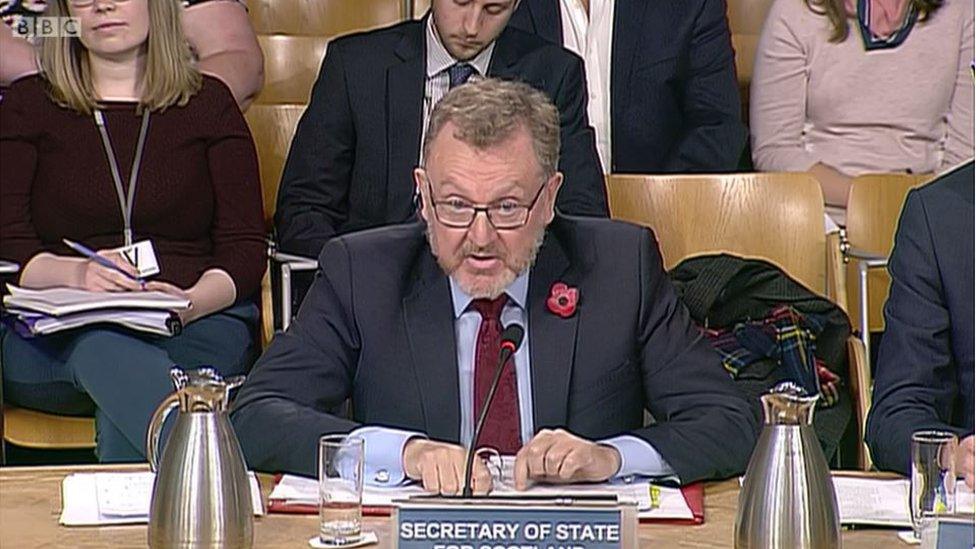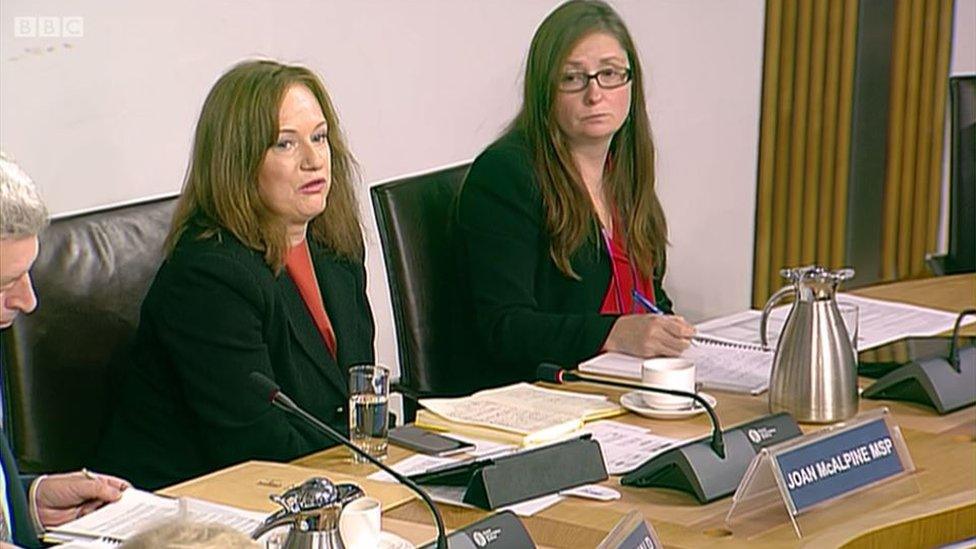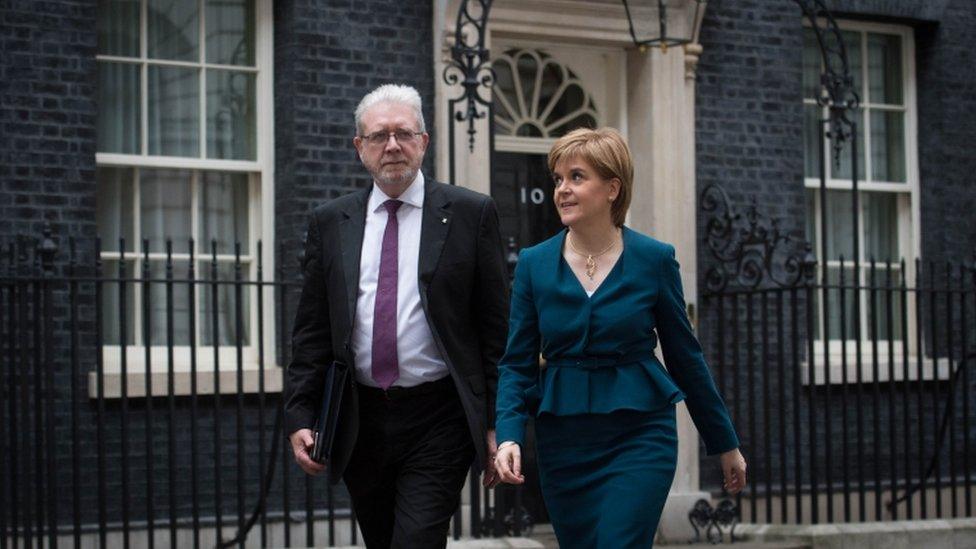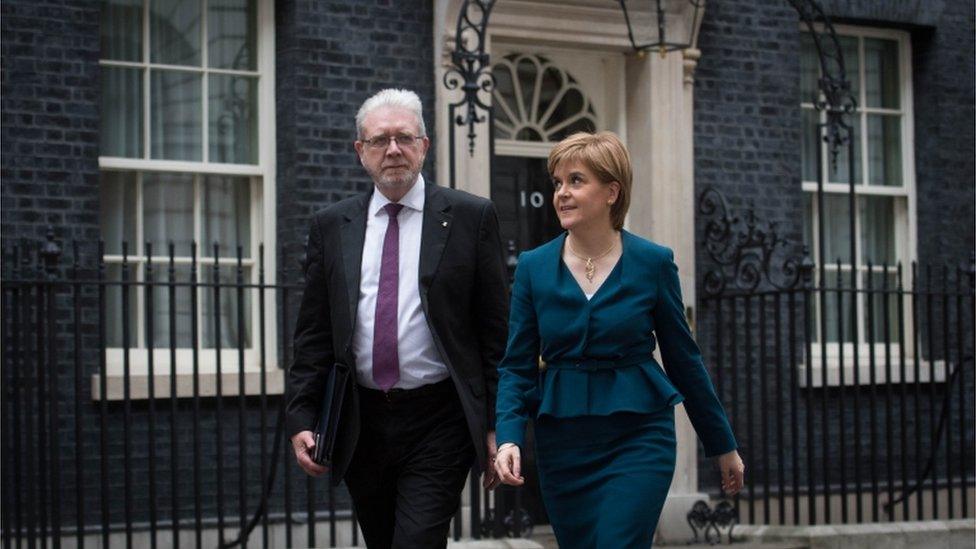No 'special deal' for Scotland in Brexit talks, MSPs told
- Published

Mr Mundell said it was "absolutely wrong" to suggest there would be "special deals" on Brexit for certain areas
Scotland will not get a "special deal" when the UK leaves the EU, the Scottish secretary has told MSPs.
David Mundell told Holyrood's Europe committee that it was "absolutely wrong" to suggest individual areas or industries could win separate deals.
However, he said there could be "differential" arrangements within the single UK deal for some sectors, such as the financial services industry.
And he said Scotland's concerns would be "right at the heart of the process".
Nicola Sturgeon has voiced frustration at the Brexit talks so far, saying after a meeting in London that she "got the strong sense the UK government itself doesn't know what it is trying to achieve".
The Scottish government is studying its options around Brexit, and Ms Sturgeon has called for a "coalition" across the UK in support of single market membership.
MSPs on the Europe Committee pressed Mr Mundell on a range of matters relating to Brexit, from the single market to the issue of Scottish independence.
'Bespoke deal'
The Scottish secretary said the UK's Brexit goal was to "maximise involvement" with the single market, adding that the UK would seek a "bespoke" deal, dismissing labels of a "hard" or "soft" Brexit.
He said: "I wouldn't believe all the media speculation which exists around special deals. David Davis confirmed when we met businesses in Glasgow that there isn't currently a plan for a "special deal" for the City [of London] or the car industry.
"There will be issues that those industries have - we know that there are issues in relation to the financial services around passporting for example.
"So there are very specific issues to specific industries, but there won't be special deals and it's absolutely wrong to characterise a suggestion that certain areas of the country will get a special deal and Scotland will not.
"What will happen for Scotland is that we will get the deal that we need to meet our interests and concerns."
Single market
Mr Mundell also appeared to suggest that leaving the EU would mean Britain leaving the single market - but it would still enjoy tariff-free access to markets.
"I accept on one level, if we are leaving the EU then essentially we are leaving the single market but access to the single market can, I think, continue in a way that doesn't involve tariffs or barriers," he told MSPs.
A Downing Street spokesman later refused to endorse his remarks, insisting that Theresa May was committed to securing the "best possible deal for Britain" outside the EU.
"Clearly we haven't started the process of exiting the EU yet. We will be triggering Article 50 at some stage in the first quarter of next year.
"Clearly we will engage in a process with the EU. Issues like that will form part of the dialogue," the spokesman said.

Committee convenor Joan McAlpine
Mr Mundell was also pressed on the issue of potential border controls at Scottish marinas post-Brexit.
He said he "can't envisage" there being controls at Stranraer due to Ireland remaining an EU member after the UK leaves, but added that "we have to ensure we don't have abuse of the system".
Committee convener Joan McAlpine said Mr Mundell's evidence had raised "a number of questions".
She said: "Will Scotland have full access to the Single Market after Brexit? What will be the position of EU citizens living in Scotland after Brexit? How many meetings of the Brexit sub-committee has he attended? We didn't get clear answers to those questions.
"The overwhelming view of those we have heard from so far has been supportive of Scotland remaining in the European single market.
"The committee will wish to hear from the secretary of state again in the near future, when he will hopefully be able to provide full answers to the many crucial questions on Scotland's future relationship with the EU."
- Published26 October 2016

- Published24 October 2016
